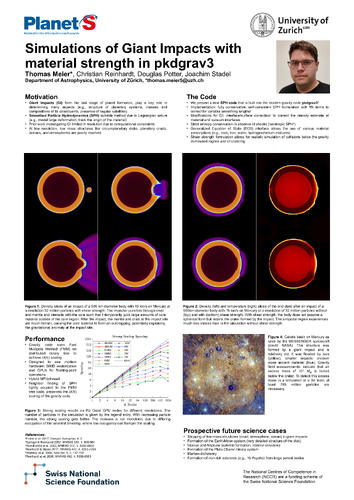Presentation

Simulations of Giant Impacts with Material Strength in pkdgrav3
Presenter
DescriptionGiant impacts form the last stage of planet formation and play a key role in determining many aspects like the final structure of planetary systems and the masses and compositions of its constituents. A common choice for numerically solving the equations of motion is the Smoothed Particle Hydrodynamics (SPH) method. We present a new SPH code with material strength built on top of the modern gravity code pkdgrav3. The code uses the Fast Multipole Method on a distributed binary tree to achieve O(N) scaling and is designed to use modern hardware (SIMD vectorization and GPU). Neighbor finding in SPH is done for a whole group of particles at once and is tightly coupled to the FMM tree code. It therefore preserves the scaling from the gravity code. A generalized Equation of State (EOS) interface allows the use of various material prescriptions. A shear strength formulation allows proper treatment of shock propagation in low velocity impacts or smaller bodies and the preservation of craters and other structures formed by impacts. With the example of the formation of the Caloris basin on Mercury (resolved with up to 2 billion particles) we demonstrate the advantages of high-resolution SPH simulations for planet scale impacts.
TimeTuesday, June 1719:00 - 21:00 CEST
LocationCampussaal - Plenary Room
SessionPoster Session and Reception
Event Type
PASC Poster

